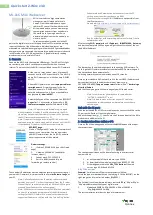
174
Appendix D
Configuration Files
<Mode = “valid_logging_mode”/>
Valid logging modes include ASCII, binary, and ASCII_PIPE.
The default is ASCII.
Use the ASCII_PIPE mode to write an XML-based custom log
file to a pipe so that the logging data is sent to a buffer in
memory. Other processes can then read the data using standard I/
O functions. The advantage of using this option is that Traffic
Server does not have to write to disk, freeing disk space for other
tasks. In addition, writing to a pipe does not stop when logging
space is exhausted because the pipe does not use disk space.
NOTE:
If you are using a collation server, the log is written to a
pipe on the collation server.
A local pipe is created even before a transaction is processed so
that you can see the pipe right after Traffic Server starts.
However, pipes on a collation server are created when Traffic
Server starts.
<CollationHosts =
“list_of_valid_hostnames”/>
A comma-separated list of collation servers to which all log
entries (for this object) are forwarded. Collation servers can be
specified by name or IP address. Specify the collation port with a
colon after the name (for example,
host:port
).
<Filters =
“list_of_valid_filter_names”/>
A comma-separated list of names of any previously defined log
filters. If more than one filter is specified, all filters must accept a
record for the record to be logged.
<Protocols =
“list_of_valid_protocols”/>
A comma-separated list of the protocols this object should log.
Valid protocol names include HTTP, NNTP, ICP.
<ServerHosts =
“list_of_valid_servers”/>
A comma-separated list of valid hostnames. This tag indicates
that only entries from the named servers will be included in the
file.
Field
Allowed Inputs















































